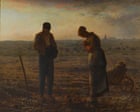Van Gogh saw compassion for the rural worker; Dalí saw phalluses and a child’s grave. As The Angelus comes to the UK, our critic celebrates a painting so deep it could even induce hallucinations
It was Salvador Dalí who turned a small, intense rural scene called The Angelus, painted by Jean-François Millet in 1857-59 and hugely popular in its day, into a totem of modern art.
In the original, a pious peasant couple have heard the Angelus bell from a distant church, the Catholic call to prayer, and paused their work digging potatoes to lower their heads and pray. But from Dalí’s writings, we know he saw far more in the painting, from obscene sex to family tragedy. In one of his many versions of it, Atavism at Twilight, the couple sprout agricultural implements from their bodies. In his surreal drawings these good country people become mouldering, mummified husks, or are transformed into fossils by time and sadness. Now that the original painting is being lent by the Musée d’Orsay to the National Gallery as the star of its forthcoming show Millet: Life on the Land, we will all get a chance to obsess over this innocent-seeming artwork.



















